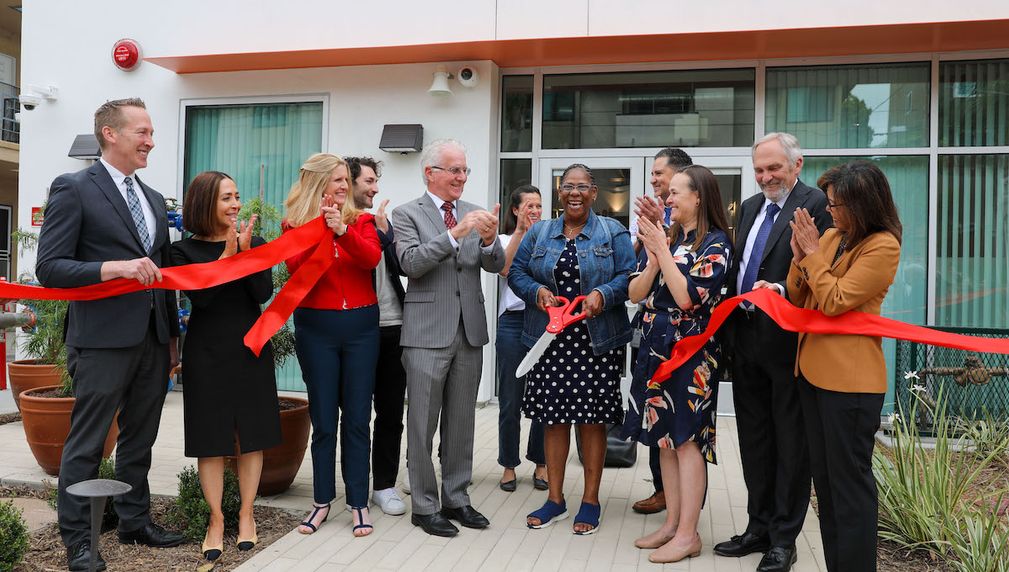Expanding Supportive Housing for Survivor Stability
In the heart of Skid Row, where hundreds of women live unsheltered, the Downtown Women’s Center offers rapid rehousing services for survivors of domestic violence. We offer immediate safety and long-term healing for survivors through trauma-informed wraparound services—such as case management, mental health care, and peer support—and survivor-led programming, ensuring that women can move from danger to dignity in a system designed to meet their unique needs. Funding will strengthen a proven pathway from crisis to stability.

What is the primary issue area that your application will impact?
Affordable housing and homelessness
In which areas of Los Angeles will you be directly working?
County of Los Angeles (select only if your project has a countywide benefit) City of Los Angeles (select only if your project has a citywide benefit)
In what stage of innovation is this project, program, or initiative?
Expand existing project, program, or initiative (expanding and continuing ongoing, successful work)
What is your understanding of the issue that you are seeking to address?
The homelessness and domestic violence (DV) crises disproportionately impact women and gender diverse individuals; over 25,000 are unhoused, and 90%+ have experienced victimization. Nearly half report surviving DV, yet the housing system remains fragmented, with few options tailored to the long-term needs of survivors.
To address this intersection, in 2018, DWC founded our DV Rapid Rehousing program to apply best practices in trauma-informed service provision for women with histories of DV and homelessness. DWC co-founded and began to co-lead the Domestic Violence & Homeless Services Coalition (DVHSC), a cross-sector alliance advancing systems change to better serve survivors experiencing homelessness, in 2016, helping reshape local policy, increase survivor housing access, and bring lived expertise to the forefront of solutions. This work reflects DWC’s deep understanding of the structural failures survivors face—and our commitment to building a survivor-centered housing ecosystem.
Describe the project, program, or initiative this grant will support to address the issue.
This grant will support DWC’s DV Rapid Rehousing (RRH) program. DWC was the first provider in the state to utilize Critical Time Intervention (CTI), an evidence-based model of support for vulnerable individuals during periods of transition. Our DV RRH program utilizes CTI to quickly place survivors in stable housing across the County and provide safety supports to build environments where they can begin to heal, while receiving wraparound services such as case management, physical/mental health care, peer-led recovery, and employment services. Aligned with CTI, DWC identifies local resources in the communities where participants are placed to support progressive independence and long-term stability beyond DWC’s direct housing assistance. DWC’s housing model aligns with the Housing First approach, prioritizing low-barrier access, survivor autonomy, and long-term safety.
The grant will also support the expansion of supportive housing options for survivors of DV, including the launch of new permanent supportive housing (PSH) units for survivors; in late 2025, DWC will open Oatsie’s Place in Van Nuys, offering 45 new units of PSH that will prioritize providing women and DV survivors with a permanent space to call home.
As co-founder of the DVHSC, DWC also advances systems change to ensure LA’s housing systems reflect the lived realities of survivors. Since 2016, the DVHSC has uplifted survivor voices and effectively advocated for new funding streams to support DV survivors.
Describe how Los Angeles County will be different if your work is successful.
Data shows that 90%+ of women experiencing homelessness experience some form of victimization in their lifetimes, including being threatened, physically hit, or made to feel unsafe by a romantic partner (48.4%); and financial victimization (48.1%). DWC was the first provider in Skid Row to implement a gendered Trauma-Informed Care (TIC) lens, and TIC is embedded across all programs to reduce re-traumatization and promote healing.
If our work is successful, more DV survivors experiencing homelessness in LA will have access to trauma-informed housing resources designed for long-term stability and healing. Survivors will no longer have to choose between safety and shelter. Public policies and funding streams will reflect survivor-centered models, and cross-sector collaboration will be the norm.
DWC’s leadership will help shift LA’s approach from crisis response to prevention and from fragmented services to coordinated care. Survivors will have a true pathway from trauma to independence.
Approximately how many people will be impacted by this project, program, or initiative?
Direct Impact: 105
Indirect Impact: 5,800